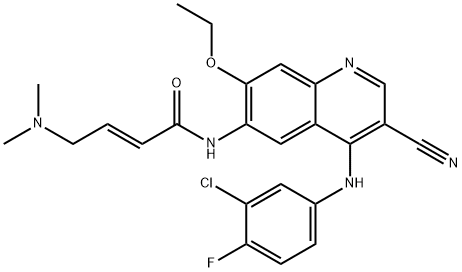Description
Pelitinib is a cyanoquinoline that irreversibly inhibits the EGFR receptor tyrosine kinase (IC
50 = 39 nM). It inhibits HER2 with a much weaker potency (IC
50 = 1.2 μM). By disrupting Akt and MAPK pathways, pelitinib can induce apoptosis and suppress the growth of tumor cell lines, displaying particularly strong efficacy against hepatocellular carcinoma cells (IC
50s = ~2 μM).
Chemical Properties
Off-White Solid
Uses
Labelled Pelitinib (P218702). A tyrosine kinase inhibitor; it is used to prepare formulation for treating primary or secondary cancer.
Uses
Pelitinib is a 3-cyanoquinoline pan-ErbB tyrosine kinase inhibitor with potential antineoplastic activity.
Definition
ChEBI: Pelitinib is an aminoquinoline, a nitrile, a monocarboxylic acid amide and a member of monochlorobenzenes. It has a role as a protein kinase inhibitor.
References
[1] torrance cj, jackson pe, montgomery e, kinzler kw, vogelstein b, wissner a, nunes m, frost p, discafani cm. combinatorial chemoprevention of intestinal neoplasia. nat med. 2000 sep;6(9):1024-8.
[2] nunes m, shi c, greenberger lm. phosphorylation of extracellular signal-regulated kinase 1 and 2, protein kinase b, and signal transducer and activator of transcription 3 are differently inhibited by an epidermal growth factor receptor inhibitor, ekb-569, in tumor cells and normal human keratinocytes. mol cancer ther. 2004 jan;3(1):21-7.




